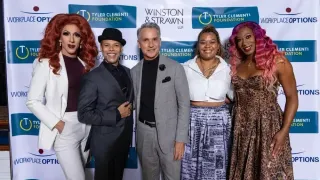
5 hours ago
Michael Arden’s Reign: How ‘The Queen of Versailles’ and Queer Storytelling Conquer Broadway
READ TIME: 4 MIN.
If you’ve walked by the St. James Theatre lately, you’ve probably caught the electric buzz: “The Queen of Versailles” has landed on Broadway, and under the whip-smart direction of Michael Arden, it’s not just a spectacle—it’s a conversation starter about who gets to dream, who pays the price, and why the stories we tell on stage matter so deeply to the LGBTQ+ community .
Let’s talk about Arden. The man’s a Tony magnet (two-time winner, if you’re counting), and his resume reads like a queer theatre kid’s fever dream: “Parade,” “Spring Awakening,” “Once on This Island,” and now, “The Queen of Versailles” . Arden’s knack for excavating the emotional core of “cautionary tales”—stories where the glitter of aspiration collides with the hard edge of reality—isn’t just a directorial style. It’s lived experience.
In Arden’s own words, he’s drawn to stories that “show us what happens when we lose ourselves chasing something shiny.” In interviews, he’s spoken about the risks and rewards of ambition—a theme that resonates with queer audiences who often have to carve out their own definitions of success, love, and identity in a world that isn’t always welcoming .
“The Queen of Versailles” is based on Lauren Greenfield’s jaw-dropping documentary, which chronicled the Siegel family’s attempt to build America’s largest home—an opulent palace that became a symbol of hubris, hope, and the heartbreak of the 2008 financial crash . In Arden’s hands, the story is both larger-than-life and achingly intimate—a high-camp musical with an undercurrent of social critique that feels right at home on Broadway.
Kristin Chenoweth, Broadway’s own pocket diva, takes on the role of Jackie Siegel, bringing both pathos and panache to a woman who’s more than just a punchline. “Jackie’s not just a queen—she’s a survivor,” Arden said in a recent interview, highlighting how the character’s resilience mirrors that of so many queer folks who’ve had to rebuild, reinvent, and reimagine themselves in the face of adversity .
And let’s be real: “The Queen of Versailles” is pure queer catnip. The show boasts music by Oscar-winner Stephen Schwartz (“Wicked” hive, rise up!) and a book by Lindsey Ferrentino, all wrapped in a production design that screams maximalism—think chandeliers, sequins, and a dash of RuPaul-level extravagance .
Why does this new musical matter so much to LGBTQ+ audiences? For starters, Arden’s presence alone is a marker of progress. Openly gay and unafraid to center queer narratives on Broadway’s biggest stages, Arden’s work continually pushes the needle on representation—not just in who’s on stage, but in how stories are told .
But it’s also about the themes. “The Queen of Versailles” dives into the dangers of assimilation—the desire to fit in, to outshine, to prove your worth in a world built on exclusion. For many queer people, that’s a familiar terrain. Arden’s direction doesn’t shy away from the bitter aftertaste of the American Dream, especially for those forced to the margins. “It’s not just about building a bigger house,” Arden remarked. “It’s about what you’re willing to lose—yourself, your community, your values—just to be invited inside” .
If you’ve ever been to a drag brunch or a Pride parade, you know that the queer community has always been masterful at creating chosen families and found spaces—homes not built with marble, but with love, solidarity, and the occasional show tune. Arden’s staging of “The Queen of Versailles” leans into this ethos. The ensemble is a kaleidoscope of identities, backgrounds, and voices, reflecting the rich diversity of today’s LGBTQ+ community .
In a particularly poignant moment, Chenoweth’s Jackie belts out a number about resilience and reinvention, the stage awash in rainbow-hued lights—an unsubtle, but effective, nod to the audience’s own journeys. It’s camp with a conscience, spectacle with a soul.
Arden’s status as a queer trailblazer isn’t just about his awards (though, let’s not pretend those Tonys look bad on a mantle). It’s about his commitment to making theatre that challenges, affirms, and transforms. From his barrier-breaking Deaf West production of “Spring Awakening” to the emotionally raw “Parade,” Arden has consistently foregrounded marginalized voices—queer, disabled, racialized—in spaces that have too often been monocultural .
With “The Queen of Versailles,” he’s once again expanding the possibilities of what—and who—Broadway can center.
So, is “The Queen of Versailles” just another glitzy musical about rich people and their problems? Not on Arden’s watch. It’s a campy, clever, and deeply queer interrogation of what it means to want more—and what it costs to get it.
As Arden himself puts it: “The stories we tell—especially on the biggest stages—shape who feels seen, who feels heard, and who gets to imagine themselves as the hero. I want every queer kid in the audience to know: your dreams are valid, your voice matters, and your story belongs here” .
With that kind of vision, Broadway’s future looks a little less Versailles, and a lot more vibrant.






